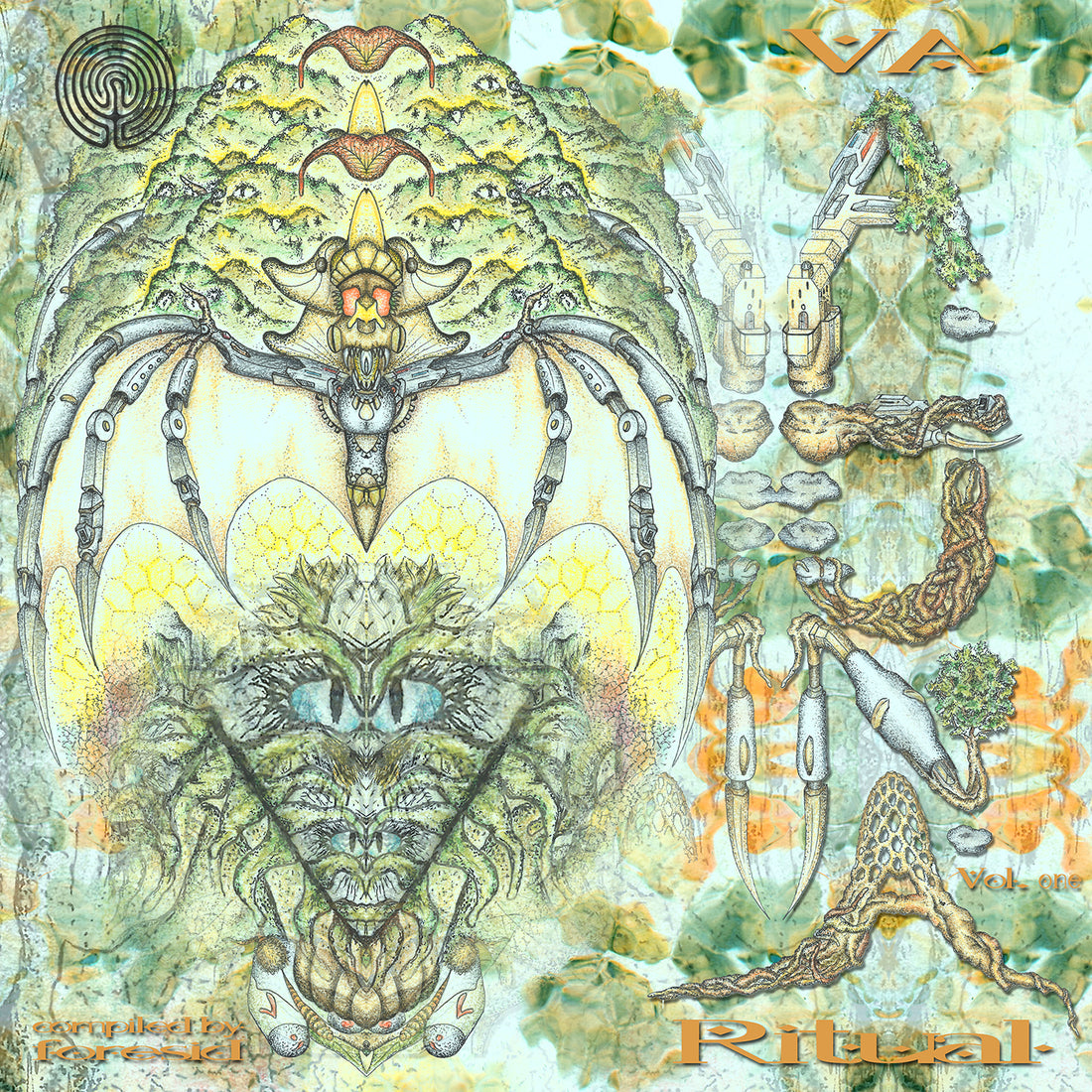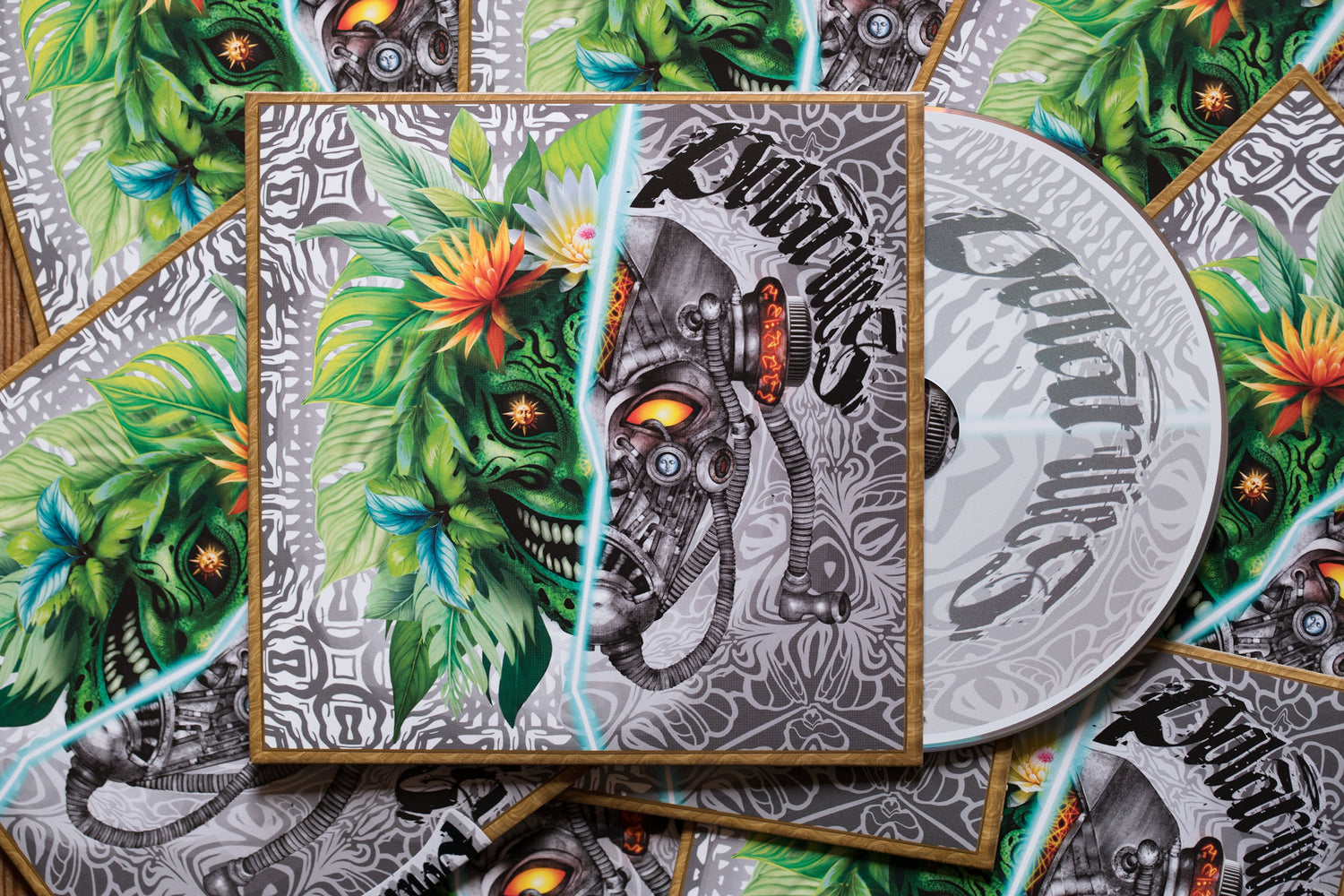
ECO VILLAGE of Don Julio - Colombia
compiled by Foresid and featuring:
Forma Mentis, Oroboro, XS, Gargoyle, Tazmanics, Dark Buddhist, Midnite Climax, Kinetik Flux.
50% of the profit from this compilation will support the ECO VILLAGE of Don Julio, in Colombia.
Let's discover more about the ECO VILLAGE:
* Some history:
In 1996 with my savings as a teacher at the Universidad del Valle in Cali, I bought a house with 80 hectares of land that had been dedicated to cattle, but that its natural vocation was environmental education. One of my daughters called it a ‘sanctuary of nature’. And we have defended it as such, not only the Nature Reserve because we converted it into a Reserve of Civil Society, but also all the territory from 2000m above sea level up to 3800m, an area that is called the ‘Canyon of Auras’ and will soon be the source of water for all the department of Quindio.
Today the Reserve is an example of nature tourism (see video) and we are making the most of the quarantine of the pandemic to begin 4 more tourism plans, a community farm and the founding of an eco-village.
* Ancestral territory of the Pijao:
When we began the construction of the new site (see photo), we found at a depth of 8m, a tomb with ceremonial cups and a funeral urn. As I have worked with indigenous populations in the south of the country and in the plains of Colombia, I understood that I had committed a serious mistake. I had permitted the violation of the tomb of a shaman. And I quickly found a lot of information about these peoples who I had never heard of. One of the things that called my attention was that the shaman was not only the spiritual leader but also the warrior chief. Through his powers, he knew where the enemy was and could organize the ambush. After consulting my shaman friends, I took the decision to dedicate the rest of my days to honoring the memory of the Pijao, as compensation for having violated the tomb of this shaman. And since then, for the last 4 years, I live happily in this paradise.
To resume, the Pijao peoples were almost an empire about which we know next to nothing. We are the sixth most ignorant country in the world about our own history. The Pijao dominated almost all of the Colombian Andes. The central mountain range, where the Reserve is found, and the eastern mountain range, together with the foothills, which are some of the best lands of the country, fertile due the volcanic ashes and sands. It is said that they lived here for about 7000 years and they left us a great inheritance: we are warriors, nobody has been able to defeat us and they taught us to be the best producers of clean food without chemicals. It is a semi-wild agriculture. And here we are organizing a model of Pijao crops.
* Territory of war:
None of those of us who lived in this area 60 years ago knew a single day of peace. There was always somebody who threatened us and involved us in their wars. The first war was the Spanish against the Pijao and it lasted about 160 years, until about 1700. They weren’t defeated by military but the diseases of the Spanish, like the flu and measles, decimated their population. The king of Spain ordered 5 great expeditions with the best of his imperial army to come and wipe the Pijao peoples off the face of the Earth. The 5 expeditions were defeated. Nobody knows how many deaths there were on each side. In the Canyon of the Auras, there is an old abandoned cemetery, a man-made plain of about 3 hectares where there are many buried from the war. But the Pijao now converted into farmers continue to make our territory be respected.
In fact, the FARC guerillas fed off the teachings and used the advantages of the Pijao topography to spend more than 60 years resisting the governing landowners. They are still alive and confronting the state although those that remain took up a mission that is not one of warriors but one of bandits, dedicated to drug trafficking and illegal mining.
The second war that we suffered was in 1950 and in essence was the persecution of the farmers by the landowners, for their fertile lands apt for growing coffee. The land and the coffee were two key factors in defining the course of the war. In this confrontation which lasted two decades, the FARC guerillas appeared and managed to keep the landowners at bay. But when the FARC took control of the territories with coca crops, they converted into the most powerful drugs cartel and created a powerful army with 150 fronts around the country and nearly 20,000 fighters and other side militias ready to take power in Colombia.
And so the third war is created, in which everyone is involved: the state, the landowners, the politicians, the paramilitary lead by Uribe, the guerillas, and the peasants and farmers. After more than 60 years of armed confrontation, this war came to an end with the Havana deal and the most optimistic of us thought that we would finally enjoy a day of peace. But it wasn’t so.
The best representation of paramilitary power came into power and other wars begin again in Colombia. Against social leaders, against the ex-members of the FARC, against the defenders of the recuperation of lands taken by drug trafficking and corrupt politicians, and against those of us who don’t want the exploitation by mining. In fact, 5km away from the Reserve there is an active mining concession which threatens our territory. But there is the promise of a warrior which is that the miners WILL NOT PASS.
* Territory of peace and the territorial development of the mountain range. Cooperative, Eco-village and farm.
But having inherited from the Pijao peoples, which don’t allow any idea of defeat, we continue building experiences of peace, fixed to the idea that we deserve another opportunity on this earth as our Nobel prize winner Gabriel Garcia Marquez sensed.
So in this territory of wars, we prepare ourselves to confront new violence. We idealize a model of territorial development of the whole mountain range of Quindio and are creating a cooperative which takes onto its shoulders the responsibility of designing and generating the project. We are moving forwards with a great project of the growing, processing and industrializing of guadua, a great inventory of environmental services, a great project of natural and community tourism, and now due to the pandemic we have structured a great project for organic agriculture.
In the Reserve, we have had the opportunity to participate with the design of two models: that of community tourism and that of the Pijao crop cultivation. Both projects have been looking for support and alliances for two years now. Today we are the point of reference and we have allies both in the private and public sectors. But maybe the most important support has been the reply to an invitation made by the Reserve. Six families arrived to the Reserve to be a part of an ECO-VILLAGE with the purpose of restarting a new life, far from the noise of the city, closer to nature, clean water and free winds. We are going to produce our own foods in the most natural and clean way. We are going to support the defense of the territory and participate with the cooperative in the development of the region.
* Transitory but urgent needs:
Three events that have taken place so far this year have been our great teachers: ALUNA, international festival of music and dance; the pandemic; and the creation of the ECO-VILLAGE.We suffered is the pandemic. Since March we cannot go out nor can travelers enter the Reserve, which have reduced our income to zero in the last 5 months. We have the hope that in August we will be able to restart our touristic activities.
The third event is the creation of the ECO-VILLAGE. Organize the arrival of 5 families has not been easy. Each one has put what they can towards their moving and upkeep here in the Reserve. We have the security that in 3 or 4 months the situation will improve with the harvest of some foods we have planted and the beginning of our touristic activities. But for now we are working and we need urgent and temporary help.




